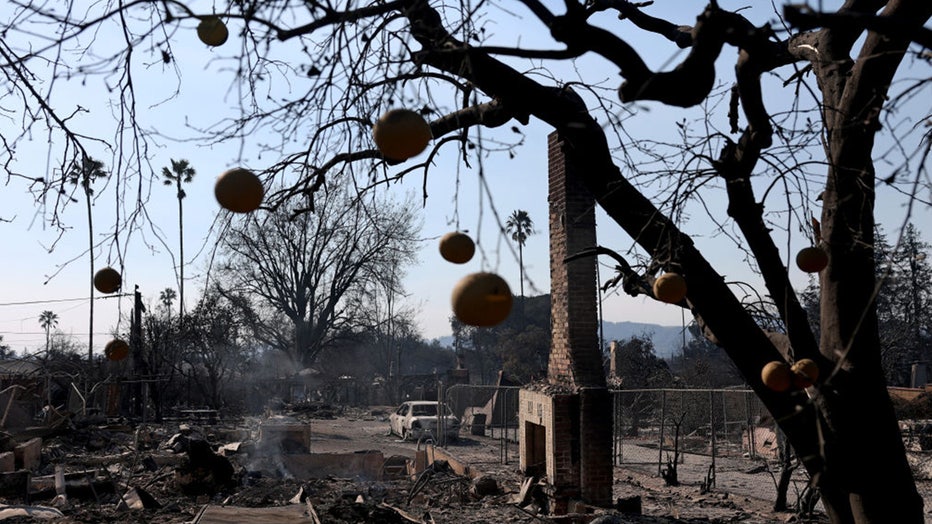Los Angeles wildfires: How to protect yourself from scams
LOS ANGELES - As deadly wildfires continue to rage on in Southern California, it’s prime time for scammers to come out of the shadows and take advantage of people when they are at their most vulnerable.
"You’ve got scams taking place, you’ve got GoFundMe that are not legitimate," Los Angeles County Supervisor Kathryn Barger said during a news conference on Friday.
Here are some ways to protect yourself from potential scams.

Fruit hangs from a tree in front of a home that was destroyed by the Eaton Fire on Jan. 10, 2025 in Altadena, California. (Photo by Justin Sullivan/Getty Images)
Be wary
The Better Business Bureau has outlined tips for ensuring donations go to legitimate charities and relief programs for the victims of the wildfires.
- Before giving to a charity, search the name of the foundation on Give.org to find out if the charity meets the BBB Standards for Charity Accountability (i.e., a BBB Accredited Charity).
"While disaster fundraising has not yet fully emerged for this tragedy, donors might check with the following BBB Accredited Charities to help start their selection of organizations offering help: American Red Cross, Direct Relief, GlobalGiving and Salvation Army," the BB said.
- Be wary of relief appeals that have vague program descriptions and do not explain what activities your support will assist.
- Online giving scams tend to pop up after a disaster to take advantage of public sympathy, the BBB advised.
"Don’t click on email, text, or social media links promising to connect you to a familiar charity. Instead, go directly to the charity’s website on your own," the agency added.
- Some crowdfunding sites, such as GoFundMe, take precautions to carefully screen, vet, and manage postings after a disaster or tragedy, but they aren’t immune to scammers.
"If unsure, review the procedures described on the site and also find out about transaction fees and other specifics," the BBB advised.
- About 40 of the 50 states require charities to annually register. Check with your state’s office of the attorney general or secretary of state’s office.
Post-wildfire scams
Even after the chaos has subsided, FEMA recommends staying vigilant when it comes to post-wildfire assistance.
- Avoid scam artists who promise a disaster grant and ask for cash deposits or advance payments in full.
"Know that federal workers do not solicit or accept money. FEMA and the U.S. Small Business Administration (SBA) staff never charge applicants for disaster assistance, inspections or help in filling out applications. Do not give out personal or sensitive information, and report people claiming to be government workers to local police," the agency advised.
- Fake home inspectors: For owners who apply for assistance, be sure to ask for an inspector’s identification badge if you ever receive a visit. Inspectors also have each applicant’s nine-digit registration number and will never require banking information.
"It is important to note that FEMA housing inspectors verify damage, but do not hire or endorse specific contractors to fix homes or recommend repairs. They do not determine your eligibility for assistance," the agency said.
- Be wary of fake contractors: It is a felony to contract without a license in a declared disaster area, FEMA said. Hire only licensed contractors and ask to see the license.Verify the contractor's license by checking online at www.cslb.ca.gov or calling CLSB at 800-321-2752.Don't rush into decisions and don't hire the first contractor who comes along.Don't pay more than 10 percent down or $1,000—whichever is less.Don't pay cash, and don't let the payments get ahead of the work.Get three bids, check references, and get a written contract.Contact CSLB if you have a complaint against a contractor.
- Hire only licensed contractors and ask to see the license.
- Verify the contractor's license by checking online at www.cslb.ca.gov or calling CLSB at 800-321-2752.
- Don't rush into decisions and don't hire the first contractor who comes along.
- Don't pay more than 10 percent down or $1,000—whichever is less.
- Don't pay cash, and don't let the payments get ahead of the work.
- Get three bids, check references, and get a written contract.
- Contact CSLB if you have a complaint against a contractor.
- Price during a state of emergency is illegal.
California’s price gouging law protects people impacted by an emergency from illegal price gouging on housing, gas, food, and other essential supplies.
Anyone who was impacted by the wildfires and believes they were a victim of price gouging, or who has information regarding potential price gouging, should immediately file a complaint through the California Attorney General’s website https://oag.ca.gov or call 800-952-5225, or contact their local law enforcement.

